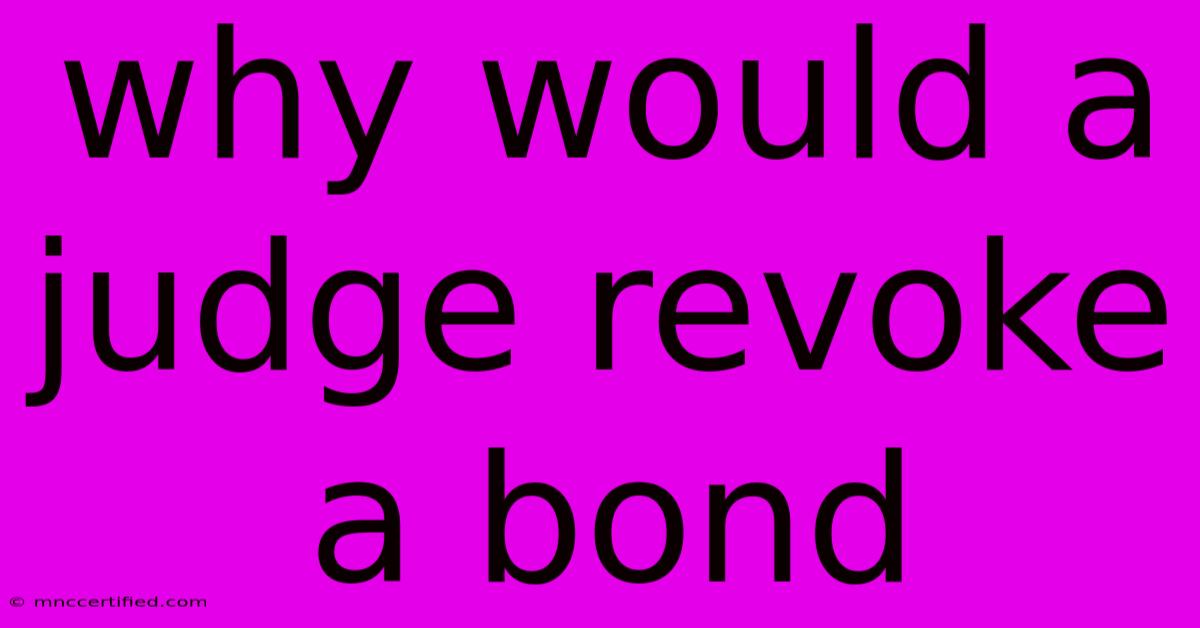Why Would A Judge Revoke A Bond

Table of Contents
Why Would a Judge Revoke a Bond? Understanding Bond Revocation
A bond, also known as bail, is a financial guarantee ensuring a defendant's appearance in court. It's a crucial part of the American justice system, allowing individuals accused of crimes to remain free until their trial. However, judges have the power to revoke a bond, sending the defendant back to jail. Understanding the reasons behind bond revocation is vital for both defendants and legal professionals. This article will explore the common causes for bond revocation, helping you understand this critical aspect of the legal process.
Key Reasons for Bond Revocation
A judge's decision to revoke a bond is never taken lightly. It involves a serious evaluation of the defendant's actions and their potential risk to the community. Here are some of the most frequent reasons:
1. Violation of Bond Conditions: The Most Common Reason
This is the most prevalent reason for bond revocation. Bond conditions, set by the judge, are specific rules the defendant must follow while out on bail. These can include:
- No contact with victims: Contacting the victim, either directly or indirectly, is a serious violation and often results in immediate bond revocation.
- No drug or alcohol use: Positive drug or alcohol tests are frequently grounds for revocation, highlighting the seriousness of the court's commitment to sobriety.
- No possession of weapons: Possessing any weapon, even a seemingly innocuous one, is a blatant violation and can lead to immediate jail time.
- Mandatory check-ins: Failing to appear for mandatory check-ins with probation officers demonstrates a lack of respect for the court and raises concerns about flight risk.
- Geographic restrictions: Leaving the designated geographical area without permission is a clear violation and signifies disregard for court orders.
- Attendance at mandated programs: Failing to comply with any court-mandated programs, such as substance abuse rehabilitation, can lead to revocation.
Failure to comply with even one condition can trigger a bond revocation hearing. The seriousness of the violation will be considered when the judge makes their decision.
2. New Criminal Charges: A Serious Indicator of Risk
Being charged with a new crime while out on bond significantly increases the risk of flight and demonstrates a disregard for the law. The judge will likely revoke the bond, especially if the new charge is serious or related to the original offense. This underscores the gravity of the situation and the court's determination to protect the community.
3. Flight Risk: A Primary Concern for Judges
Judges are primarily concerned with ensuring the defendant appears for trial. If the judge believes the defendant is a flight risk – meaning they are likely to flee the jurisdiction before trial – they will likely revoke the bond. Factors contributing to this assessment might include:
- Lack of ties to the community: Individuals with weak community ties, such as no job, family, or significant property, are considered higher flight risks.
- Prior history of failing to appear in court: A defendant's history plays a crucial role in determining flight risk. Previous failures to appear in court significantly increase the chances of bond revocation.
- Seriousness of the original charge: More severe charges, such as violent crimes or felonies, often increase the perceived flight risk.
4. Threat to Public Safety: Protecting the Community
If the judge believes the defendant poses a threat to public safety, bond revocation is a strong possibility. This could stem from:
- Threats made against victims or witnesses: Credible threats made to victims or witnesses can trigger immediate bond revocation.
- Violent tendencies or history of violence: A history of violence or violent tendencies are concerning indicators and can justify the revocation of bond.
The Bond Revocation Process
The process typically involves a hearing where the defendant is given the opportunity to present their case. They can offer explanations for their alleged violations, present evidence, and potentially call witnesses. However, the ultimate decision rests with the judge.
Seeking Legal Counsel
If you face bond revocation, seeking legal counsel immediately is crucial. An experienced attorney can help you understand your rights, prepare for the hearing, and build a strong defense. They can also navigate the complex legal procedures involved in bond revocation.
Disclaimer: This article provides general information about bond revocation and should not be considered legal advice. It's crucial to consult with a qualified legal professional for advice tailored to your specific situation.

Thank you for visiting our website wich cover about Why Would A Judge Revoke A Bond. We hope the information provided has been useful to you. Feel free to contact us if you have any questions or need further assistance. See you next time and dont miss to bookmark.
Featured Posts
-
Velocity Investments Llc Lawsuit
Nov 22, 2024
-
Pamela Hayden Retires From Simpsons
Nov 22, 2024
-
2025 Qb Lewis Joins Deion Sanders
Nov 22, 2024
-
Dubai Jail Threat Uk Backing Britons Case
Nov 22, 2024
-
Reverend Richard Coles Age Husband Music
Nov 22, 2024